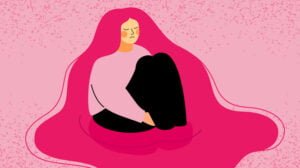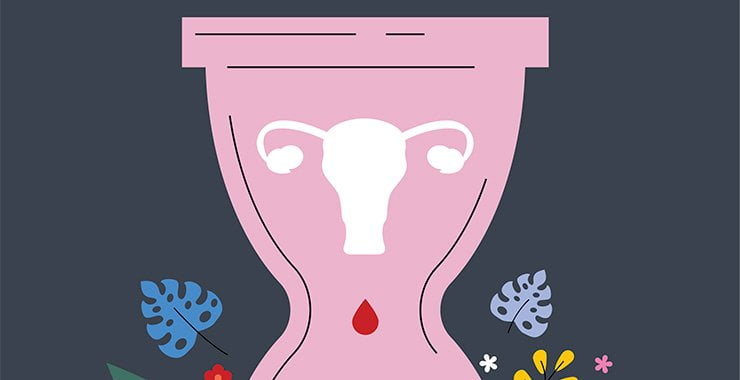Menopause, a natural biological process marking the end of a woman’s reproductive years, brings with it a myriad of physical and emotional changes. While some women sail through this transition smoothly, others find themselves grappling with postmenopausal depression. This often-overlooked aspect of menopause can significantly impact a woman’s quality of life. In this blog, we’ll delve into the causes, symptoms, and, most importantly, the treatment for postmenopausal depression.
Contents
Understanding Postmenopausal Depression

Postmenopausal depression is a type of depression that occurs after menopause, typically in women aged 50 and above. The hormonal fluctuations during menopause, particularly the decline in estrogen levels, play a crucial role in triggering mood swings and emotional distress. However, it’s essential to recognize that various factors, including biological, psychological, and social elements, contribute to this condition.
Common Symptoms of Postmenopausal Depression:
- Persistent feelings of sadness or hopelessness
- Irritability and mood swings
- Sleep disturbances, including insomnia or oversleeping
- Fatigue and low energy levels
- Changes in appetite and weight
- Difficulty concentrating or making decisions
- Loss of interest in previously enjoyable activities
- Physical symptoms like headaches and body aches
Treatment Options for Postmenopausal Depression
Postmenopausal depression can significantly impact a woman’s well-being, and it’s essential to explore various treatment options to address the multifaceted nature of this condition. Here’s an in-depth look at the treatment options available for postmenopausal depression:
Therapy

Several therapeutic approaches can be beneficial in addressing postmenopausal depression, providing women with tools to cope with emotional challenges and enhance overall well-being. Here are some effective therapies for postmenopausal depression:
Cognitive-Behavioral Therapy (CBT)
- Overview: CBT is a widely used and evidence-based therapeutic approach that focuses on identifying and changing negative thought patterns and behaviors.
- Application: In the context of postmenopausal depression, CBT can help women recognize and challenge distorted thinking, manage stress, and develop coping strategies for dealing with mood swings and emotional fluctuations.
- Effectiveness: CBT has shown effectiveness in improving mood and reducing symptoms of depression by addressing cognitive distortions and promoting healthier behaviors.
Interpersonal Therapy (IPT)
- Overview: IPT is a short-term, structured therapy that improves interpersonal relationships and communication skills.
- Application: For postmenopausal depression, IPT can help women navigate changes in relationships, address feelings of loss or isolation, and enhance social support networks. It often explores how changes in roles, life transitions, and interpersonal conflicts contribute to emotional distress.
- Effectiveness: IPT has demonstrated efficacy in reducing depressive symptoms and improving overall emotional well-being.
Mindfulness-Based Stress Reduction (MBSR)
- Overview: MBSR is a mindfulness-based program incorporating meditation and mindfulness exercises to promote awareness and reduce stress.
- Application: In the context of postmenopausal depression, MBSR can help women develop mindfulness skills to manage stress, regulate emotions, and cultivate a more balanced perspective on life changes.
- Effectiveness: Research suggests that mindfulness-based interventions can lead to improvements in mood and well-being for individuals experiencing depression.
Psychodynamic Therapy
- Overview: Psychodynamic therapy explores unconscious thoughts and emotions, focusing on how past experiences and relationships influence present behavior.
- Application: For postmenopausal depression, psychodynamic therapy can help women explore and understand the emotional impact of menopausal changes, providing insight into underlying issues that may contribute to depressive symptoms.
- Effectiveness: While psychodynamic therapy may be a longer-term approach, it can lead to profound insights and facilitate emotional healing.
To take these therapies, visit HerMantra for the best consultation online.
Medications

Medication can be a valuable component of the treatment plan for postmenopausal depression, especially when symptoms are severe or not adequately managed by non-pharmacological interventions. It’s essential to consult with a healthcare professional to determine the most suitable medication based on an individual’s health history, the specific nature of their depressive symptoms, and potential side effects. Here are some classes of medications commonly prescribed for postmenopausal depression:
Antidepressants:
- Selective Serotonin Reuptake Inhibitors (SSRIs):
- Examples: Fluoxetine (Prozac), Sertraline (Zoloft), Paroxetine (Paxil)
- Mechanism: SSRIs increase the availability of serotonin in the brain, a neurotransmitter that plays a key role in mood regulation.
- Effectiveness: SSRIs are commonly prescribed for their efficacy in treating depression and are considered a first-line treatment.
- Selective Serotonin Reuptake Inhibitors (SSRIs):
Serotonin-Norepinephrine Reuptake Inhibitors (SNRIs):
- Examples: Venlafaxine (Effexor), Duloxetine (Cymbalta)
- Mechanism: SNRIs increase the levels of both serotonin and norepinephrine, providing a dual mechanism of action to improve mood.
- Effectiveness: SNRIs are often used when SSRIs alone are not sufficient, and they may have additional benefits in addressing physical symptoms such as pain and fatigue.
Tricyclic Antidepressants (TCAs):
- Examples: Amitriptyline, Nortriptyline
- Mechanism: TCAs increase the levels of serotonin and norepinephrine in the brain.
- Effectiveness: While less commonly prescribed due to their side effect profile, TCAs may be considered when other classes of antidepressants are ineffective.
Atypical Antidepressants:
- Bupropion (Wellbutrin):
- Mechanism: Bupropion acts on dopamine and norepinephrine and is often considered when sexual side effects or weight gain are concerns with other antidepressants.
- Effectiveness: Bupropion can be effective in improving mood and has a lower risk of sexual side effects compared to some other antidepressants.
- Bupropion (Wellbutrin):
Monoamine Oxidase Inhibitors (MAOIs):
- Examples: Phenelzine (Nardil), Tranylcypromine (Parnate)
- Mechanism: MAOIs increase the levels of serotonin, norepinephrine, and dopamine by inhibiting the enzyme monoamine oxidase.
- Effectiveness: MAOIs are typically reserved for cases where other antidepressants have not been effective due to their potential for serious side effects and interactions.
Adjunctive Medications:
- Anxiolytics and Sedatives: Medications like benzodiazepines or certain non-benzodiazepine options may be prescribed to address anxiety or sleep disturbances.
- Stimulants: In some cases, stimulant medications may be considered to address fatigue and low energy levels associated with depression.
Lifestyle Modifications

Lifestyle modifications play a crucial role in managing postmenopausal depression. These changes can positively impact mood, and overall well-being, and contribute to a healthier transition through menopause. Here are some lifestyle modifications that may be beneficial for women experiencing postmenopausal depression:
Regular Exercise:
- Type: Engaging in aerobic exercises like walking, jogging, swimming, or cycling.
- Frequency: Aim for at least 150 minutes of moderate-intensity exercise per week.
- Benefits: Regular exercise has been shown to improve mood, reduce stress, and enhance overall mental well-being. It also helps maintain physical health, which is particularly important during and after menopause.
Balanced Diet:
- Nutrient-Rich Foods: Include a variety of fruits, vegetables, whole grains, lean proteins, and healthy fats in your diet.
- Hydration: Ensure adequate water intake to support overall health and well-being.
- Limit Sugar and Processed Foods: High-sugar and processed foods can contribute to mood swings and energy fluctuations.
- Omega-3 Fatty Acids: Foods rich in omega-3 fatty acids, such as fatty fish (salmon, mackerel), flaxseeds, and walnuts, may have mood-stabilizing effects.
Adequate Sleep:
- Establish a Routine: Maintain a consistent sleep schedule by going to bed and waking up at the same time each day.
- Create a Restful Environment: Ensure your bedroom is conducive to sleep – dark, quiet, and comfortable.
- Limit Screen Time: Reduce exposure to electronic devices before bedtime, as the blue light emitted can interfere with sleep.
Stress Management:
- Mindfulness and Relaxation Techniques: Practice mindfulness meditation, deep breathing exercises, or progressive muscle relaxation to manage stress.
- Time Management: Organize your daily activities and prioritize tasks to avoid feeling overwhelmed.
- Hobbies and Leisure Activities: Engage in activities you enjoy to unwind and promote a sense of fulfillment.
Support Groups
Joining a support group for postmenopausal depression can be a valuable and empowering step in managing the emotional challenges associated with this phase of life. Support groups provide a safe and understanding environment where women can share experiences, gain insights, and receive encouragement. Here are some options for finding postmenopausal depression support groups:
- Local Mental Health Organizations: Contact local mental health organizations, community centers, or women’s health clinics to inquire about any support groups specifically addressing postmenopausal depression. They may offer in-person or virtual meetings.
- Hospitals and Medical Centers: Check with hospitals or medical centers in your area. They may organize support groups, workshops, or educational sessions related to mental health and menopause.
- Online Support Groups: Explore online platforms and forums dedicated to women’s health and menopause. Websites like HerMantra or HealthUnlocked often have discussion forums where women share their experiences and provide support.
- Women’s Health Organizations: Organizations such as the North American Menopause Society (NAMS) may provide resources or information about local support groups. NAMS, in particular, focuses on menopause-related health issues and may guide you to relevant support networks.
- Meetup Groups: Visit meetup.com to search for local or online groups related to menopause or women’s health. This platform often hosts various interest-based groups where you can find like-minded individuals.
- Therapist or Counselor Recommendations: If you are already working with a therapist or counselor, inquire if they are aware of or can recommend support groups for postmenopausal depression. Mental health professionals often have networks and resources to connect individuals with supportive communities.
Herbal Remedies

The efficacy of herbal remedies can vary, and their safety is not guaranteed. Before considering any herbal supplement, it’s crucial to consult with a healthcare professional to ensure compatibility with your health and any medications you may be taking. Here are some herbal remedies that have been studied for their potential effects on mood and menopausal symptoms:
- St. John’s Wort (Hypericum perforatum)
- Black Cohosh (Actaea racemosa or Cimicifuga racemosa)
- Dong Quai (Angelica sinensis)
- Ginseng (Panax ginseng)
- Red Clover (Trifolium pratense)
Conclusion
Postmenopausal depression is a real and challenging aspect of menopause that deserves attention and understanding. Recognizing the symptoms and seeking appropriate treatment is crucial for improving the overall quality of life for women navigating this transformative phase.
Remember, each woman’s journey is unique, and finding the right combination of treatments tailored to individual needs is key to overcoming postmenopausal depression. If you are facing menopause-related issues, menopause treatment at HerMantra can help. Book your free trial online menopause treatment session now.


